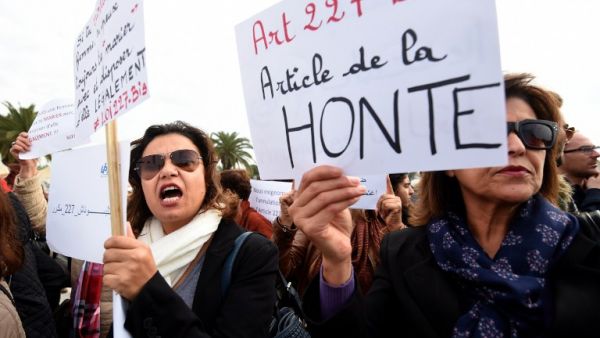هالأسبوع نشارك فيه فرحة التونسيات و الأردنيات #الغاء_308
— Haya (@enhayar) August 1, 2017
“This week, we share in the joy of Tunisian and Jordanian women,” one tweet read on Tuesday.
The women’s rights movement in much of the Arabic-speaking world is often an uphill struggle against social conservatism and outdated misogynistic laws. This week, however, the news from MENA has given feminists something to smile about.
Last Wednesday, July 26, Tunisia’s Parliament approved landmark legislation on violence against women, including domestic violence. The wide-ranging law aims at ending “all violence against women” defined as “any physical, moral, sexual or economic aggression."
#Tunisie : une loi historique contre les violences faites aux femmes a été adoptée par le parlement tunisien pic.twitter.com/W4Mf8s80J6
— DogFight (@Dogfight2018) July 31, 2017
A historic law against violence committed against women has been adopted by the Tunisian parliament
“Tunisia’s new law provides women with the measures necessary to seek protection from acts of violence by their husbands, relatives, and others,” said Amna Guellali, director of Human Rights Watch’s Tunisia office.
The breakthrough came after decades of campaigning from women’s rights campaigners demanding legal protection for the estimated 47 percent of Tunisian women who are subjected to domestic violence.
No more legal loopholes for rapists
Among the changes to Tunisian law is the removal from the penal code of an article allowing rapists to avoid serving their sentences if they marry their victims.
This development was mirrored in Jordan on Tuesday, after the country’s Parliament removed the controversial article 308 from its own penal code.
- Activists in Jordan Protest Law Allowing Rapists to Marry Their Victims
- End Article 308: No to Marriage Loophole for Rapists, Say Jordanians
The victory was preceded by a concerted social media campaign, including an online petition signed by civil society activists and a sit-in in front of Jordan’s Parliament on Tuesday morning.
“Abolish 308” had trended on Twitter as Jordanians pushed for the removal of the law. Supporters of the article claim it helps to protect a woman's honor following rape. However, many activists and politicians in Jordan refute those suggestions, arguing instead that it violates women's right to justice and to protection from their attackers.
"مبروك للأردن.. تم #الغاء_308.. وشكرا لجهود كافة أفراد المجتمع الذين وقفوا مع الحق" - @FadiZaghmout
— MyKali Magazine (@mykali_mag) August 1, 2017
Congratulations to Jordan #308 has been canceled. And thanks to the efforts of all the members of the community who stood for what is right.
اخيراً اخبار بتفرح شوي، تم #الغاء_٣٠٨ الضغط الشعبي له دائماً مفعول السحر و"الزن" النسوي أولى بالتطبيق. عقبال #اسقاط_الولاية في #السعودية
— المحامي محمد الرفاعي (@MohaAlRefai) August 1, 2017
Finally some happy news #308 was cancelled. Popular pressure always has the magic touch and feminist 'zen' is the first to apply. Here's hoping for the #end_to_male_guardianship in #Saudi
Male guardianship takes a knock
As this tweet points out, the male guardianship system, which requires Saudi women to receive approval from a male relative for many everyday activities, may live on.
However, this week it received a not inconsiderable knock.
Saudi women took to Twitter on Monday to celebrate the release of a women’s rights campaigner after 104 days in prison. Maryam al-Otaibi, an anti-guardianship activist, was imprisoned after fleeing her father’s house to live an independent life.
The hashtag “Maryam is free without a [male] guardian” began trending after al-Otaibi was reportedly released from al-Malaz jail in Riyadh without getting a relative’s permission.
#مريم_حره_بدون_ولي Incredible tweets by #Saudi women celebrating release of Maryam Aloteibi, w/out guardian permission. Feminist victory.
— Mona Eltahawy (@monaeltahawy) July 30, 2017
Maryam Al Oteiby released from prison w/o a guardian to bail her out!! Unheard of in the land of patriarchy!!
— TheIgnoranceSlayer (@ArabFeminist13) July 30, 2017
#مريم_حره_بدون_ولي
A MAJOR milestone in Saudi women's demands for independence from male guardianship.I knew it was just a matter of time #مريم_حره_بدون_ولي
— Shatha_PhD (@Shatha_AnnArbor) July 30, 2017
Al-Otaibi had previously launched the hashtag “I am my own guardian” which existed alongside the ongoing tag “Saudi women demand the fall of male guardianship,” which has so far gone through 391 incarnations since it was launched, adding a number for each day.
- A Feminist Victory in Saudi: Anti-guardianship Activist Maryam al-Otaibi Finally Released
- #StopEnslavingSaudiWomen: The bold campaign tackling Saudi's male guardianship laws
Got so far to go
Although these victories are cause for celebration among rights campaigners, there still remains a lot to be done
While Jordan and Tunisia may have removed their marriage loopholes for rapists, the fight goes on in a number of other Middle Eastern and North African countries.
Proposals to remove similar provisions are currently being considered by the Lebanese and Bahraini parliaments respectively. In Algeria, Iraq, Kuwait, Libya, Palestine, Syria the law continues to allow rapists to get away with their crime, at the expense of their victims.
Meanwhile, in Saudi Arabia, “Saudi women demand the fall of male guardianship,” was trending again on Tuesday as Saudi women continue their push for greater equality in the ultra-conservative kingdom.
#سعوديات_نطلب_اسقاط_الولايه391
— البــنــــــدري (@b_b12331) August 1, 2017
تاق اليوم
Today’s tag.







